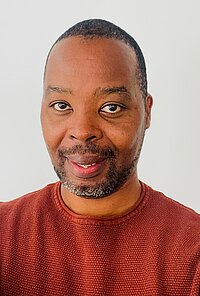Dr. David K. Ngugi
Research Division 3: Marine Ecology
RU Marine Symbioses
Aquatic Microbial Ecogenomics Group (AquaMEG)
Office:
Room: 4.519
Phone: +49 431 600-4490
Email: dngugi@geomar.de
Address:
Wischhofstraße 1-3, Building 5, Room: 4.519
D-24148 Kiel
Research interests
My research focusses on two areas:
(1) host-microbe interactions in various non-model organisms
(2) climate change microbiology with a focus on aquatic systems
In the first, I am in interested in the role of microorganisms in habitat acclimation and nutrition in the sponge meta-organism, the genetic mechanisms of adaptation facilitating invertebrate colonization at the marine/land boundary, and the role and evolutionary history of the enteric microbiome in herbivorous surgeonfish and how they impact reef biogeochemical processes.
In the second area of my research, I am interested in the eco-evolutionary responses of aquatic microorganisms to environmental change, and in particular the link between ecosystem service provision and microbial biodiversity in the context of climate change. In both research areas, I extensively use large-scale metagenomes and other omics data coupled with cutting-age computational biology approaches, including machine learning techniques, to gain insights into future biodiversity trends and to elucidate functional responses of keystone species in an ecosystem constrained by global climate change.
Education & academic positions
Education
2024 Diploma in Data Science (Machine Learning), University of Sorbonne, France
2005–2008 PhD (Microbial Ecology), MPI for Terrestrial Microbiology, Germany
2002–2004 MSc. (Microbiology), Jomo Kenyatta University of Agriculture and Technology, Kenya
1997–2002 Bachelor of Education, Kenyatta University, Kenya
Academic Positions
2018–2023 Junior Group Leader, Leibniz Institute DSMZ, Braunschweig, Germany
2016 –2018 Senior bioinformatics research scientist, KAUST, Saudi Arabia
2010–2016 Research Scientist, Red Sea Research Center, KAUST, Saudi Arabia
2008–2010 Postdoc, MPI for Terrestrial Microbiology, Marburg, Germany
Awards and Fellowships
- ISME12 travel grant from the International Max Planck Research School (Germany)
- Doctoral fellowship from the German Academic Exchange Service (DAAD)
- Internship fellowship from the International Max Planck Research School, Germany
Third-Party Funding
- (2021–2024) - 246,995 € research grant, the German Research Foundation (DFG) as Co-Principal investigator
- (2020–2024) - 253,000 € research grant, the German Research Foundation (DFG) as Principal investigator
Professional Services
Managing Board Member for Peer Community in Microbiology (PCI Microbiology)
Associate Editor for Marine Biology and Frontiers Microbiology
Selected Publications
5 Key Publications (total of 45; complete publication list is available in Google Scholar or ORCID)
- Ngugi DK, Salcher MM, Andrei A-S, Ghai R, Klotz F, Chiriac M-C, Ionescu D, Buesing P, Grossart H-P, Xing P, Priscu JC, Alymkulov S, and Pester M. (2023). Postglacial adaptations enabled colonization and quasi-clonal dispersal of ammonia-oxidizing archaea in modern European large lakes. Science Advances, 9:adc9392.
- Ngugi DK, Silvia GA, Sánchez P, Gasol JM, Agusti S, Karl DM, and Duarte CM. (2023). Abiotic selection of microbial genome size in the global ocean. Nature Communication, 14: 1384.
- Pogoreutz C, Oakley CA, Raedecker N, Cárdenas A, Perna G, Peng L, Davy SK, Ngugi DK, and Voolstra CR. (2022). Coral holobiont cues prime Endozoicomonas to a symbiotic lifestyle. The ISME Journal, 16:1883–1895.
- Duarte CM, Ngugi DK, Alam I, Pearman J, Kamau A, Eguiluz VM, Gojobori T, Acinas S, Gasol JM, Bajic VB, and Irigoien X. (2020). Sequencing effort dictates gene discovery in marine microbial metagenomes. Environmental Microbiology, 22:4589–4603.
- Ngugi DK, Miyake S, Cahill MJ, Vinu M, Hackmann TJ, Blom J, Tietbohl M., Berumen M., and Stingl U. (2017). Genomic diversification of giant enteric symbionts reflects host dietary lifestyle. PNAS, 114:E7592–E7601.



![[Translate to English:] ORCID Ngugi, David](/fileadmin/_processed_/5/c/csm_ORCID_iD.svg_780844d8d3.png)
![[Translate to English:] Google Scholar - Ngugi, David](/fileadmin/_processed_/f/b/csm_google_scholar_5241fa0653.png)
![[Translate to English:] Research_Gate - Ngugi, David](/fileadmin/_processed_/4/1/csm_Research_Gate_Logo_cb76298cb4.png)
